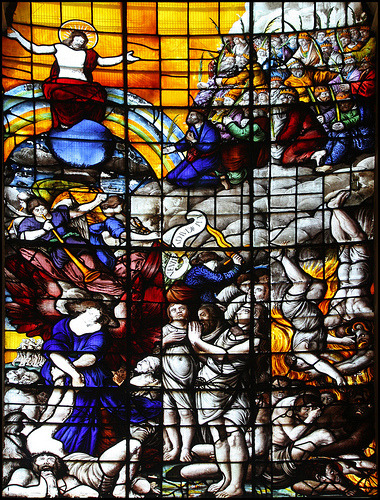
HOMILY for 21st Mon per annum (II)
2 Thess 1:1-5. 11-12; Ps 95; Matt 23:13-22
Today the lectionary begins its readings from St Paul’s second letter to the Thessalonians, one of the shorter Pauline epistles. The introduction opens with a standard greeting to the Christians in Thessalonica, and then we’re given the context in which the letter is written. It goes out to a community that is suffering persecution.
This context gives the letter a very contemporary tone, as we hold in our hearts all those Christian communities around the world, particularly in Iraq, who are suffering persecutions and afflictions. And recently, the charity, Aid to the Church in Need reported with pride, much as St Paul had for the Thessalonians, about the steadfast fidelity of the Christians of Iraq who hold on to their faith in Christ and practice charity even in such difficult times. With a similar pride, we are grateful to our Dominican sisters in Iraq for their witness of charity and faith.
Indeed, among the Thessalonions, St Paul finds all three of the theological virtues: their “faith is growing abundantly” and their “love… is increasing” (2 Thess 1:3), we’re told. And as for hope, it is implied in the “steadfastness and faith” that the Thessalonians show under persecution. But hope implies awaiting something, or someone. What are the Thessalonians hoping for?
Unfortunately, the editors of the Lectionary have cut out 5 verses from this opening section of St Paul’s letter, that is to say, almost half of the section. And this missing section tells us what the Thessalonians hoped for, which is to see God’s “righteous judgement” done. Verse 5 tells us that God’s justice will reward those who suffer for the sake of the Kingdom so that they will enjoy God’s presence. But what about those who are inflicting the suffering, who are persecuting God’s Church, and afflicting the Thessalonians?
Perhaps it is deemed un-politically correct to consider the righteous judgement of God which is due them, and that is a great shame. For the Scriptures are inspired in their entirety so the missing section of second Thessalonians ought to be heard and thought about; it is not for us to correct and censor the Word of God. So, here’s what verses 6-10 say.
“…Since indeed God deems it just to repay with affliction those who afflict you, and to grant rest with us to you who are afflicted, when the Lord Jesus is revealed from heaven with his mighty angels in flaming fire, inflicting vengeance upon those who do not know God and upon those who do not obey the gospel of our Lord Jesus. They shall suffer the punishment of eternal destruction and exclusion from the presence of the Lord and from the glory of his might, when he comes on that day to be glorified in his saints, and to be marveled at in all who have believed, because our testimony to you was believed” (2 Thess 1:6-10).
Now we can see clearly what it is that the persecuted Christians hoped for: they awaited God’s justice and deliverance. And so St Thomas says that while the saints do not enjoy the punishment of the wicked, they do rejoice in their deliverance and in God’s divine justice even if that entails the punishment of the wicked. But that, of course, is God’s righteous judgement. What befalls the wicked is, therefore, just and good and right. Who are we to judge and correct God?
If this situation worries us then we ought not to avoid thinking about it, as the editors of the Lectionary seem to want, but rather consider how it challenges us. Given that St Paul himself was once a persecutor of the Christian people, his life bears witness to the fact that those who afflict God’s Church can, by God’s grace, be converted and repent. So we should pray for the conversion of those who persecute Christians, and we should read this passage and make it known so that those who are tempted to do evil against God’s Church do not think, wrongly, that they can do so with impunity. Let all, therefore, turn from their wicked ways and seek God’s mercy and justice.
thekidinme101 liked this
lawrenceop posted this